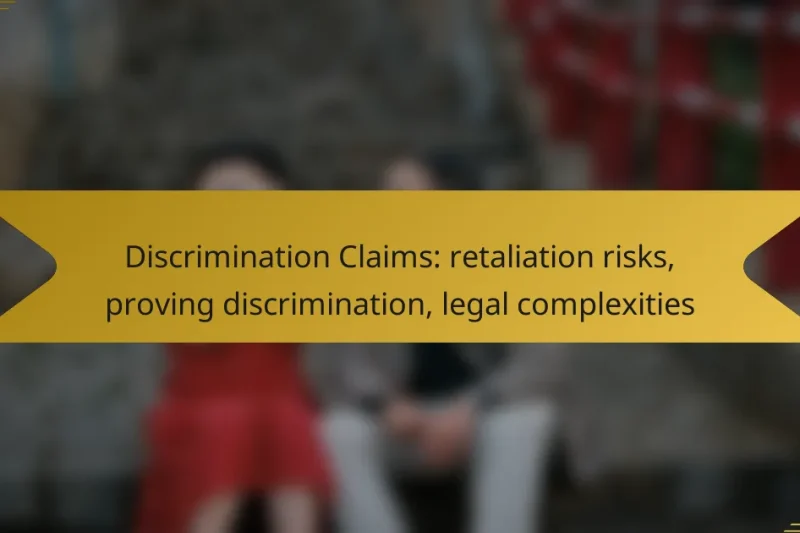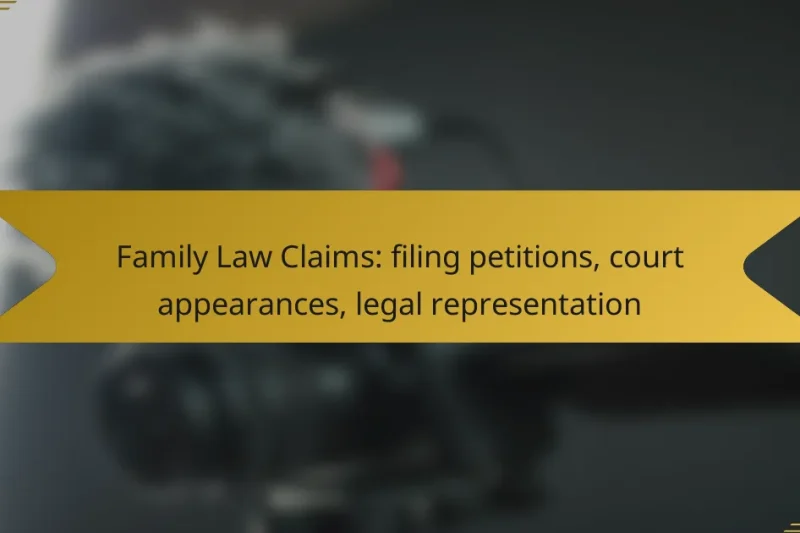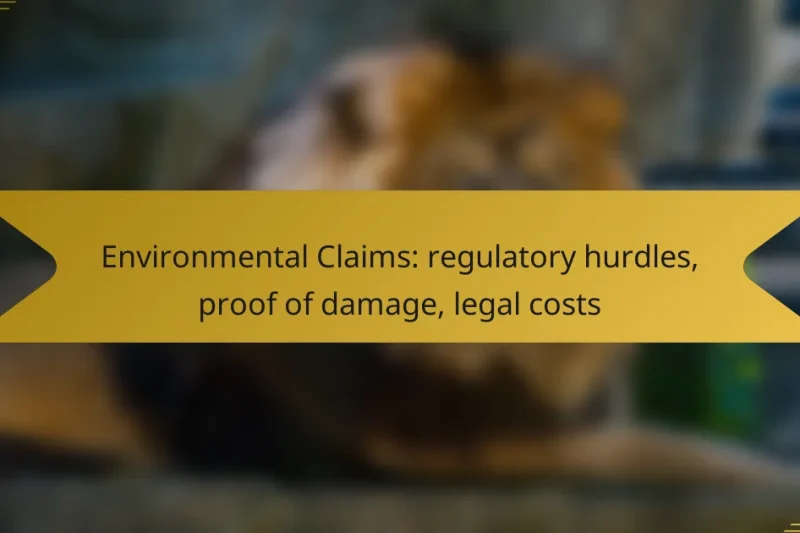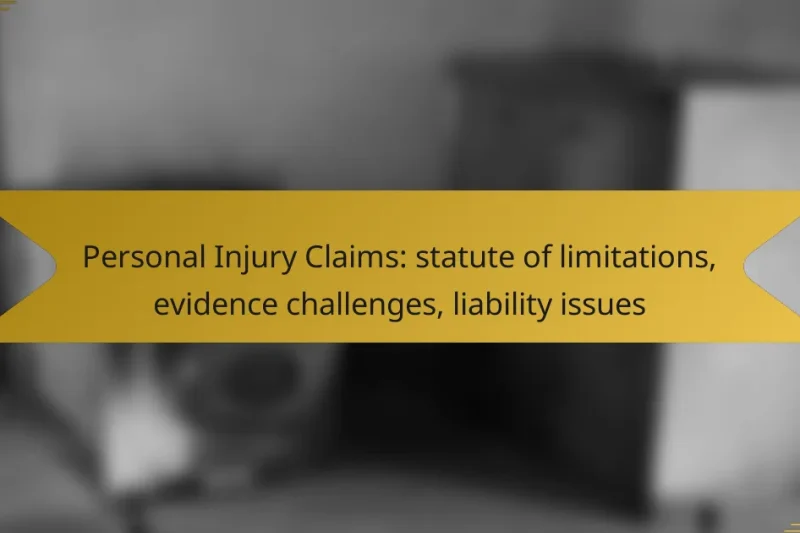Workers’ compensation claims can often face rejection due to various reasons, leaving employees frustrated in their … Workers’ Compensation Claims: claim rejections, employer retaliation, benefit limitsRead more
Risks and Limitations of Different Claims
Understanding the risks and limitations associated with different claims is crucial for businesses aiming to maintain credibility and compliance. Misleading advertising can result in legal repercussions and loss of consumer trust, emphasizing the need for clarity and truthfulness in messaging. Each industry faces unique guidelines that shape how claims are made, highlighting the importance of adhering to specific regulations and consumer expectations.
Discrimination Claims: retaliation risks, proving discrimination, legal complexities
Discrimination claims present significant challenges, particularly regarding retaliation risks that can impact both employees and employers. … Discrimination Claims: retaliation risks, proving discrimination, legal complexitiesRead more
Employment Claims: job security risks, legal costs, proving wrongful acts
Employment claims in the UK often stem from issues such as unfair dismissal, discrimination, and wage … Employment Claims: job security risks, legal costs, proving wrongful actsRead more
Family Law Claims: filing petitions, court appearances, legal representation
Family law claims in the UK address various legal matters such as divorce, child custody, and … Family Law Claims: filing petitions, court appearances, legal representationRead more
Environmental Claims: regulatory hurdles, proof of damage, legal costs
Environmental claims present significant challenges for businesses, particularly in navigating regulatory hurdles such as advertising standards … Environmental Claims: regulatory hurdles, proof of damage, legal costsRead more
Personal Injury Claims: statute of limitations, evidence challenges, liability issues
Understanding personal injury claims involves navigating key aspects such as the statute of limitations, evidence requirements, … Personal Injury Claims: statute of limitations, evidence challenges, liability issuesRead more
Product Liability Claims: proving negligence, high litigation costs, settlement risks
Product liability claims in the UK often stem from defects in design, manufacturing, or marketing, each … Product Liability Claims: proving negligence, high litigation costs, settlement risksRead more
Insurance Claims: policy exclusions, bad faith claims, lengthy processes
Insurance claims can be complicated by various factors, including policy exclusions that outline specific situations not … Insurance Claims: policy exclusions, bad faith claims, lengthy processesRead more
Property Damage Claims: underinsurance, claim denials, legal disputes
Property damage claims can be fraught with complications, including underinsurance, claim denials, and legal disputes. By … Property Damage Claims: underinsurance, claim denials, legal disputesRead more
Breach of Contract Claims: financial risks, counterclaims, legal fees
Breach of contract claims occur when one party fails to meet their obligations under a legally … Breach of Contract Claims: financial risks, counterclaims, legal feesRead more
What are the risks of misleading claims in advertising?
Misleading claims in advertising can lead to significant consequences for businesses, including legal issues, diminished consumer trust, and financial losses. Advertisers must be cautious to ensure their messages are clear and truthful to avoid these risks.
Legal repercussions
Misleading advertising can result in legal action from regulatory bodies or consumers. In many countries, laws such as the Federal Trade Commission Act in the United States prohibit false or deceptive advertising practices. Violations can lead to lawsuits, fines, or even injunctions against further misleading claims.
Companies may also face class-action lawsuits if consumers feel deceived. Legal costs can accumulate quickly, making it essential for businesses to verify their claims before publication.
Loss of consumer trust
When consumers encounter misleading claims, their trust in the brand diminishes. Trust is a crucial component of customer loyalty, and once lost, it can be challenging to regain. Brands that consistently mislead may find their reputation permanently damaged.
To rebuild trust, companies must focus on transparency and honesty in their marketing efforts. Engaging with customers and addressing concerns can help restore confidence over time.
Financial penalties
Financial penalties for misleading claims can vary widely depending on the severity of the violation and the jurisdiction. In some cases, fines can reach into the millions, particularly for large corporations. Additionally, the costs associated with legal defense and potential settlements can further strain a company’s finances.
To mitigate these risks, businesses should conduct thorough reviews of their advertising materials and ensure compliance with relevant advertising standards. Investing in legal advice can also help prevent costly mistakes.
How do claims vary by industry in the UK?
Claims differ significantly across industries in the UK, influenced by regulations and consumer expectations. Each sector has specific guidelines that dictate how claims can be made, ensuring they are truthful and not misleading.
Health and wellness claims
Health and wellness claims in the UK are strictly regulated, particularly by the Food Standards Agency (FSA) and the Advertising Standards Authority (ASA). These claims must be substantiated by scientific evidence and cannot imply that a product can cure or prevent diseases unless approved.
Common examples include claims about vitamins or supplements that suggest benefits for immune support or energy levels. Businesses must ensure that any health claims are backed by credible research to avoid penalties and maintain consumer trust.
Financial service claims
Financial service claims are governed by the Financial Conduct Authority (FCA) in the UK, which mandates that all marketing communications must be clear, fair, and not misleading. This includes claims about investment returns, loan terms, or insurance benefits.
For instance, a claim stating that a savings account offers “the best interest rates” must be supported by comparative data. Companies should be cautious about making bold claims that could mislead consumers, as this can lead to significant legal consequences.
Food and beverage claims
Food and beverage claims in the UK are regulated under the EU Food Information for Consumers Regulation. These claims must be accurate and not misleading, with specific rules governing terms like “organic,” “gluten-free,” or “low-fat.”
For example, a product labeled as “low-fat” must contain a certain percentage of fat compared to its full-fat counterpart. Businesses should ensure that their claims are compliant with these regulations to avoid fines and protect their brand reputation.
What limitations exist for specific claims?
Specific claims often face limitations that can impact their validity and acceptance. These limitations can arise from scientific backing requirements, regulatory compliance challenges, and market competition factors.
Scientific backing requirements
Scientific backing is crucial for substantiating claims, especially in health and wellness sectors. Claims must be supported by rigorous research, often requiring randomized controlled trials or systematic reviews to demonstrate efficacy.
For example, a dietary supplement claiming to improve heart health should ideally reference studies published in peer-reviewed journals. Without solid scientific evidence, such claims may be dismissed by consumers and regulatory bodies alike.
Regulatory compliance challenges
Regulatory compliance is a significant hurdle for many claims, especially in industries like food, pharmaceuticals, and cosmetics. Different countries have varying regulations, such as the FDA in the United States or EFSA in the European Union, which dictate what can be claimed and how.
Companies must navigate these regulations carefully to avoid penalties. For instance, a product marketed as “clinically proven” may require specific approvals and documentation to ensure it meets local standards.
Market competition factors
Market competition can limit the effectiveness of specific claims, as numerous products may make similar assertions. In a crowded marketplace, standing out with a unique claim becomes challenging, and consumers may become skeptical of all claims.
To differentiate, businesses should focus on unique selling propositions and ensure their claims are not only accurate but also resonate with consumer needs. For instance, a skincare brand might emphasize natural ingredients alongside clinical results to appeal to a broader audience.
How can businesses mitigate risks associated with claims?
Businesses can mitigate risks associated with claims by implementing proactive strategies that focus on research, transparency, and legal compliance. These steps help ensure that claims are substantiated and communicated clearly, reducing the likelihood of disputes or regulatory issues.
Conducting thorough research
Thorough research is essential for businesses to substantiate their claims. This involves gathering data from reliable sources, understanding industry standards, and verifying the accuracy of any information presented. For instance, a company making health-related claims should consult scientific studies and regulatory guidelines to ensure compliance.
Additionally, businesses should regularly review and update their research practices to stay current with evolving regulations and market trends. This proactive approach helps prevent misinformation and enhances credibility.
Implementing transparent marketing practices
Transparency in marketing practices builds trust with consumers and reduces the risk of misleading claims. Businesses should clearly communicate the basis for their claims, including any limitations or conditions that apply. For example, if a product is marketed as “eco-friendly,” the company should specify what criteria were used to determine this classification.
Moreover, businesses should avoid exaggeration and ensure that all promotional materials are consistent with the claims made. This can be achieved by using straightforward language and providing supporting evidence where possible.
Seeking legal advice
Consulting with legal experts is crucial for businesses to navigate the complexities of claims and regulations. Legal professionals can provide guidance on compliance with advertising laws, intellectual property rights, and consumer protection regulations. This is particularly important in industries with stringent regulations, such as pharmaceuticals or food and beverages.
Regular legal reviews can help identify potential risks before they escalate into legal disputes. Businesses should consider establishing a relationship with a legal advisor who specializes in their industry to ensure ongoing compliance and risk management.
What frameworks can guide claim validation?
Several frameworks can assist in validating claims, ensuring they are truthful and not misleading. Key guidelines include industry standards and regulations that help businesses navigate the complexities of advertising and consumer protection.
Advertising Standards Authority guidelines
The Advertising Standards Authority (ASA) provides a set of guidelines that govern advertising practices in the UK. These guidelines emphasize the need for advertisements to be legal, decent, honest, and truthful, ensuring that claims made are substantiated and not misleading.
Businesses should ensure that any claims in their advertisements are backed by evidence. For example, if a product claims to be “the best,” it should be supported by comparative data or consumer testimonials. Failure to comply with ASA guidelines can lead to sanctions, including the removal of ads and reputational damage.
Consumer Protection from Unfair Trading Regulations
The Consumer Protection from Unfair Trading Regulations (CPRs) in the UK protect consumers from misleading actions and omissions. These regulations require that all claims made by businesses must be accurate and not create false impressions about a product or service.
To comply with CPRs, businesses should conduct thorough research before making claims. For instance, if a product is marketed as “eco-friendly,” it must meet specific environmental standards. Non-compliance can result in legal action and financial penalties, making it crucial for businesses to understand and adhere to these regulations.
What are the emerging trends in claims and advertising?
Emerging trends in claims and advertising focus on transparency, accountability, and the use of advanced technologies. Companies are increasingly adopting data-driven strategies to enhance targeting while ensuring compliance with regulations and consumer expectations.
Increased scrutiny on digital advertising
Digital advertising is facing heightened scrutiny from regulators and consumers alike. This trend is driven by concerns over data privacy, misleading claims, and the ethical implications of targeted advertising. Companies must navigate these challenges to maintain trust and compliance.
To address this scrutiny, businesses should prioritize clear and honest messaging in their advertisements. For instance, providing explicit disclosures about data usage and ensuring that claims are substantiated can help build credibility. Additionally, staying informed about regulations such as the General Data Protection Regulation (GDPR) in Europe is crucial for compliance.
Common pitfalls include vague claims that can mislead consumers or failing to update practices in line with new regulations. Companies should regularly review their advertising strategies and consider implementing a checklist to ensure all claims are accurate and transparent.









